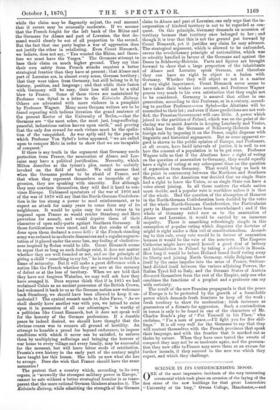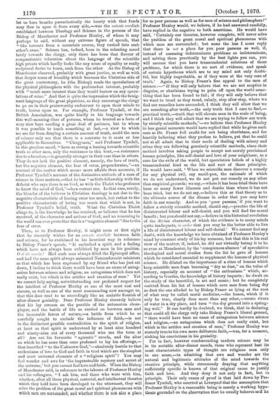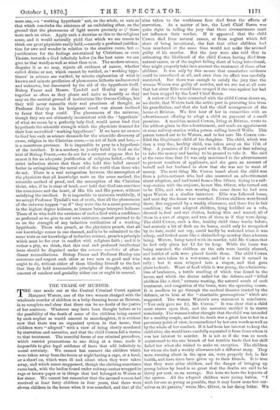SCIENCE IN ITS CONDESCENDING MOOD. ()NE of the most impressive
incidents of the very interesting
ceremonial which took place on occasion of the laying of the first stone of the new buildings for that great Lancashire " University of the busy," Owens College, Manchester,—and
let us here breathe parenthetically the hearty wish that funds may flow in upon it from every side,—was the entente cordiale established between Theology and Science in the persons of the Bishop of Manchester and Professor Huxley, of whom it may perhaps be said, without any extreme figure of speech, that " like torrents from a mountain source, they rushed into each other's arms." Science has, indeed, been in the relenting mood lately towards the clergy, only there has been that flavour of compassionate toleration about the language of the scientific high priests which hardly looks like any sense of equality or really reciprocal desire to learn, each from the other. As the Bishop of Manchester observed, probably with great justice, as well as with that deeper sense of humility which becomes the Christian side of the great controversy, he (the Bishop) reads the speculations of the physical philosophers with the profoundest interest, probably with "much more interest than they would bestow on any specu- lations of mine." And that is quite the impression which the benig- nant language of the great physicists, as they encourage the clergy to go on in their praiseworthy endeavour to open their minds to truth, leaves upon us. For example, Professor Tyndall, at the British Association, was quite kindly in his language towards this well-meaning class of persons, whom he treated as a form of very slow boys needing a great deal of patience, but to whom it was possible to teach something at last,—a view to which we are far from denying a certain amount of truth, could the men of science only see that there is a converse to it more or less applicable to themselves. " Clergymen," said Professor Tyndall, in this gracious mood, " have as strong a leaning towards scientific truth as other men, only the resistance to this bent,—a resistance due to education,—is generally stronger in their case than in others. They do not lack the positive element, namely, the love of truth, but the negative element, the fear of error, preponderates,"—an account of the matter which seems more affable than accurate, if Professor Tyndall's account of the distinctive attitude of a man of science in these matters,—that he has "as little fellowship with the Atheist who says there is no God, as with the Theist who professes to know the mind of God,"—be a correct one. In that case, surely, the blunder of the believer in Christian theology is not due to the negative characteristic of fearing error too much, but rather to the positive characteristic of loving too much that which is not, in Professor Tyndall's belief, truth. What the Christian Theist clings to, is the knowledge he has received, or believes that he has received, of the character and actions of God, and no reasoning in the world can ever prove that this is a "negative element" due to the fear of error.
Then, as to Professor Huxley, it might seem at first sight that he sincerely wishes for an entente cordiale between faith and science, for he exclaimed in his heartiest way in reference to Bishop Fraser's speech, "It embodied a spirit and a feeling which have not always been exhibited by men in his position. 0 si sic oinnia ! Had such men always filled the Episcopal office, and had the same spirit always animated Nonconformist ministers as that which has been expressed by my friend who has just sat down, I incline to think there would have been no cause of antag- onism between science and religion, an antagonism which does not really exist, but which is the artifice and creation of men." Yet we cannot help saying, notwithstanding our profound respect for the intellect of Professor Huxley as one of the most real and sincere, as well as one of the most commanding now amongst us, that this does read to us exceedingly like an amiable flourish of after-dinner geniality. Does Professor Huxley sincerely believe that his lay sermon on the parable of the automaton chess- player, and the battle of life as carried on between man and the inexorable forces of nature,—a battle from which he so carefully sought to exclude the influence of faith,—is not in the distinctest possible contradiction to the spirit of religion, at least as that spirit is understood by at least nine hundred and ninety-nine out of every thousand who use the term at all ? Are not his favourite " agnostic " creeds, and the altar on which he has more than once professed to lay his offerings,— that inscribed " to the Unknown God,"—absolutely hostile to that enthusiasm of love to God and faith in God which are the simplest and most universal elements of a "religious spirit"? You may feel wonder and awe for 'the impenetrable mystery and secret of the universe,' but you cannot feel love and faith. When the Bishop of Manchester said, in reference to the labours of Professor Huxley and his colleagues, "I ask him, and those who were with him, whether, after all these physical, material, and intellectual theories which they hold have been developed to the uttermost, they will solve the problem of the great moral and spiritual phenomena with which men are surrounded, and whether there is not also a place for us poor parsons as well as for men of science and philosophers?" Professor Huxley would, we believe, if he had answered candidly, have replied in the negative to both assertions. He would have said, Certainly our theories, however complete, will never solve the problem of the great moral and spiritual phenomena with which men are surrounded ; but none the less I must reply that there is not a place for you poor parsons as well, if, instead of assuming indeterminate problems as indeterminate, and solving them practically by the best lights you can, you will assume that you have transcendental solutions of these problems, for which there is no sort of evidence, and speak of certain hypotheses which are to my mind not only doubt- ful, but highly improbable, as if they were at the very core of truth.' Again, to Bishop Fraser's fine appeal to the men of science :—" If they will only believe that we are not sceptics in disguise, or charlatans trying to palm off upon the world some- thing that has been found to fail ; if they will only believe that we want to tread as they tread, calmly, step after step, where we find our remedies have succeeded, I think they will allow that we are searching after truth,—the only truth that I care to find,— practical truth,—truth that will elevate man in the scale of being, and I think they will admit that we are trying to follow out truth by strictly scientific methods,"—we believe that Professor Huxley in less genial moments would have replied that while he gives such men as Dr. Fraser full credit•for not being charlatans, and for heartily believing what they profess to believe, yet that he could not at all admit that in their mode of dealing with misery and crime they are following genuinely scientific methods, since their method involves asking people to accept not merely provisional human principles, like self-denial and love of your neighbour, as a cure for the evils of the world, but speculative beliefs of a highly transcendental kind as the life and root of those principles. He would have said, When we scientific men discover a remedy for any physical evil, say small-pox, the rationale of which we do not understand, we do not put our remedy on any other than empirical grounds ; we say,—where it has been tried there have been so many fewer illnesses and deaths than where it has not been tried, but we do not say,—believe this or that theory as to the ultimate source of the disease in order that you may have faith in our remedy. And so you ' poor parsons,' if you want to follow a strictly scientific method, should say,—practise the life of disinterested labour and self-denial, and you will find the moral benefit; but you should not say,—believe in this historical revelation of the divine character, of which the evidence is to many minds quite inadequate, in order that you may be the better able to live a life of disinterested labour and self-denial.' We cannot feel any doubt, with the knowledge we have obtained of Professor Huxley's mind by constant study of his lay sermons, but that this is his real view of the matter, if, indeed, he did not virtually betray it to be so even at Manchester, by the ' conspicuous absence' of speculative theological and moral studies from the list he gave of lessons which he considered essential to supplement the lessons of physical science. He dilated on the importance of a class of lessons which keep scientific men from becoming "dry as dust," on the value of history, especially on account of " the enthusiasm " which, ac- cording to Goethe, the knowledge of history imparts ; he dwelt on the study of the beautiful, in art and music ; but he completely omitted from his list of lessons which save men from being dry as dust the one alluded to by Bishop Fraser as lying at the root of what may be called moral medicine,—the lesson, which if it only be true, clearly does more than any other,—create rivers of water in a dry place, and turn " the dry ground into a spring- ing well." It can hardly be doubted, we think, that in declaring that could all the clergy only take Bishop Fraser's liberal ground, "there would have been no cases of antagonism between science and religion,—an antagonism which does not really exist, but which is the artifice and creation of men," Professor Huxley was scarcely true to his own more deliberate faith,—was, for a moment, sinking his convictions in his geniality.
For in fact, however condescending modern science may be in its sociable after-dinner moods, those who represent best its most characteristic types of thought are religious men only in one sense,—in admitting that awe and wonder are the natural and legitimate attitudes of the mind towards the creative principle, while strenuously denying that anything sufficiently specific is known of that original cause to justify faith and love. And they deny it not only in fact, but in principle. Their only canon of proof is that laid down by Pro- fessor Tyndall, who asserted at Liverpool that the assumption that Professor Huxley is a reasonable being is merely a working hypo- thesis grounded on the observation that he usually behaves as if he were one,—a working hypothesis' not, on the whole, so sure as that which concludes the existence of an undulating ether, on the ground that the phenomena of light occurs precisely as if there were such an ether. Apply such a doctrine as this to the religious sense, and it would naturally yield that which we see reason to think our great physicists really hold,—namely a profound justifica- tion for awe and wonder in relation to the creative cause, but no justification for the feelings entertained by Christians, or even Theists, towards a God infinitely holier (in the best sense we can give to that word) as well as wiser than man. The modern science, disguise it as we may, rejects all evidence of causes, whether called divine or not, which cannot be verified, as I working hypo- theses' in science are verified, by minute explanation of what is known and minute prediction of phenomena hitherto undiscovered and unknown, but discovered by the aid of the hypothesis itself. Bishop Fraser .and Messrs. Tyndall and Huxley may dine 'together as often as they please and unite as heartily as they may on the neutral ground of institutions like Owens College, but they will never reconcile their real premisses of thought, as Professor Huxley in his benignant mood was almost inclined to fancy that they could. The phenomena of the universe, though they are not ultimately inconsistent with the hypothesis' of what we mean by a perfectly holy God, would never lend that ;hypothesis the scientific strength which the physicists demand for their best accredited working hypotheses.' If we have no avenue to God but such as science demands for the scientific discovery of -cause, religion in the Christian sense,—an act of faith and love,— is a monstrous pretence. It is impossible to pray to a hypothesis of the intellect. It is a mockery to justify belief in God on the hint of Bishop Fraser,—we do not for a moment suppose that he meant it for an adequate justification of religious belief,—that a -strict induction shows that those who hold this belief succeed -better in extinguishing the moral evil of the world than those who do not. There is a real antagonism between the assumption of the physicists that all knowledge rests on the same method, the scientific method of proof, and the assumption of the Christian theist, who, if he is clear of head, must hold that God can convince the conscience and the heart, of His life and His power, without satisfying the intellect. It is impossible to maintain truthfully, if we accept Professor Tyndall's test of truth, that all the phenomena -of the universe happen " as if" they were due to a cause possessing in the highest degree holiness, as human beings interpret holiness. Those of us who hold the existence of such a God with a confidence .as profound as we give to our own existence, cannot pretend to do so on the strength of any inductive verification of a working hypothesis. Those who preach, as the physicists preach, that all our knowledge comes in one channel, and is to be submitted to the -same tests as our knowledge of inductive science, preach a principle which must be for ever in conflict with religious faith ; and it is -rather a pity, we think, that this real and profound intellectual issue should be disguised under the ententes cordiales of after- dinner reconciliations. Bishop Fraser and Professor Huxley can -reverence and respect each other as two men so good and wise -ought to do, without either of them blinding himself to the fact -that they do hold irreconcilable principles of thought, which no .amount of candour and geniality either can or ought to conceal.
































 Previous page
Previous page